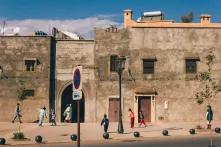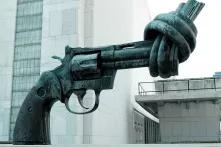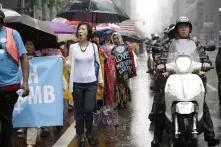Pakistan is a war zone facing serious threats from militants and terrorists besides a number of other problems and difficulties that urgently demand the establishment of democratic structures as well as rule of law. In the light of the current crisis, high-ranking guests from Pakistan and various German experts discussed structures and deficits of rule of law as well as the current state of affairs. ➢ Recent articles and publications on the Middle East and North Africa
Download the complete conference paper as pdf file (16 pages, 131 kB)
Pakistan is a war zone facing serious threats from militants and terrorists besides a number of other problems and difficulties that urgently demand the establishment of democratic structures as well as rule of law. In the light of the current crisis, high-ranking guests from Pakistan and various German experts discussed structures and deficits of rule of law as well as the current state of affairs, parallel legal systems, the relationship between politics and judiciary and the role of political parties and society.
The current situation in FATA, where the Pakistan army tries to root out militants, was certainly the main focus of discussions. The crisis in the tribal areas is not only a military conflict but a conflict of governance. Consequently, FATA needs to be mainstreamed into the provincial and also national assembly and the constitution and laws must be extended to this area. Furthermore, rule of law is closely connected to the fight against extremism and militancy. The Taliban are not strong but benefit from the weaknesses and deficits of the state in regard to rule of law and governance. They grew strong because the government does not provide any basic rights such as education, health and most important access to justice.
Decades of dictatorships have weakened democratic structures and rule of law
Since the Supreme Court has legitimized a military coup in the 1950ies for the first time the judiciary has become subservient to ruling regimes. In this regard, courts do not exceed their competences but they do not make sufficient use of their powers when needed. It was not before March 2007, when the first Chief Justice of the country resisted a ruling regime and thus spurred a movement fighting for the establishment of rule of law. The Lawyers Movement has contributed to a general understanding of the importance to restore the deposed judges and to install an independent judiciary. In the course of this movement, a new Pakistan has emerged including a vibrant civil society a free media and active political parties.
Despite major developments during the past two years democratic structures still need to be strengthened. A country cannot be democratized if for example one of the main pillars of democracy, the political parties, is completely undemocratic, corrupt and dominated by family politics. Political parties have contributed a lot to the loss of power of the parliament. Therefore, strengthening institutions is very closely related to strengthening political parties. In this regard, special emphasis needs to be put on programmatic parties because charismatic and clientelistic parties, which are present in Pakistan, are detrimental to democracy.
Major sectors of Pakistan social and political structure, particularly politics and governance institutions, are dominated by the elites or feudal families hampering rule of law and democracy for the sake of their own interests. It is mainly the elite benefiting in regard to economic and social justice, access to quality education and health facilities or access to the judicial system. Furthermore, corruption and a lack of accountability dominate the system and as long as those who have violated the constitution are not accountable, ordinary people hardly can expect justice or rule of law. Therefore, people are frustrated and turn towards other institutions in their search of justice and thus contribute to the emergence of various competing systems. Particularly the existing parallel legal systems reveal deficits and contradictions affecting mostly women and minorities. Therefore, there is a need of a unified judicial system instead of parallel structures in order to ensure justice for the people. However, Islamic legal institutions coexisting to national legal institutions may also serve to bridge normative conflicts regarding certain religious issues.
If democracy in Pakistan shall succeed, there is an urgent need to create a balance of power in state structures particularly with regard to the relationship of military and government and president and prime minister. In addition, Pakistan needs to develop democratic politics and procedures of voting for or against certain political forces instead of military coups ousting a malfunctioning civilian government. An important experience of democracy is to let governments fail. However, democracies are only functioning well if rule of law is already established, but rule of law does not function if there is a democracy trying to establish rule of law.
Nevertheless, rule of law cannot be installed or enforced mechanically - it is a process and needs to grow gradually.
Various speakers emphasized that the only solution for the diverse and complex problems of Pakistan is Rule of Law as the only way to win hearts and minds of the people particularly in FATA. Therefore, democracy must deliver – including justice - if Pakistan wants to go back on the path of stability. But the crucial question is: who will provide it?
Table of Contents
-
Executive Summary
-
I Conference - Rule of Law in the Islamic Republic of Pakistan
Current State of Affairs in Pakistan - Scope and Limitations for the Rule of Law- Panel I: Parallel legal Systems, Myths and Realities
Rule of Law and Gender
Relevance of Rule of Law for Pakistan and the Crisis in FATA
The Existence of Different Competing Systems
Rule of Law from a Legal Pluralism Perspectiv - Panel II: Rule of Law, Politics and the Role of the Judiciary
Constitutional Courts and Politics
The Role of Political Elites
The Role of Elections
Constitutional Laws and the Role of Constitutional Court - Panel III: Political Parties, Civil Society and the Rule of Law
Rule of Law and Society: Does Law Matter?
Democracy and Rule of Law
Political Parties and Power Structures - Conclusion
- Panel I: Parallel legal Systems, Myths and Realities
- You can download the complete conference paper as pdf file (16 pages, 131 kB)
Further texts related to the topic:
- Download "Ray of Hope: The Case of Lawyers’ Movement in Pakistan" as pdf file (24 pages, 403 kB) Research paper by Azmat Abbas and Saima Jasam


